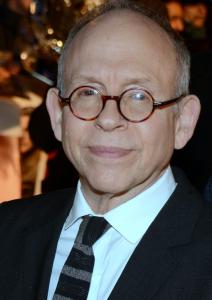
Source and License: Wikimedia
Bob Balaban. The name’s enough really. If I had seen it on a page before I’d seen the man himself on a screen, I’d have liked the cut of his jib. His parents named him “Robert.” He was smart enough to go with the alliteration; on name alone, he’s got my trust. Like Philip Baker Hall or F. Murray Abraham, he haunts the edges of your favorite media. You could swear you’ve seen him before, but you aren’t sure. Indeed, you probably have. Bob Balaban pops up in everything: Midnight Cowboy (1969), Close Encounters of the Third Kind (1977), Altered States (1980), Ghost World (2001), Gosford Park (2001), Capote (2005), Seinfeld (1989-1998), Friends (1994-2004), and a slew of Woody Allen, Wes Anderson, and Christopher Guest movies.
B.B. is everywhere. When we need a dependable actor to play a cowardly, neurotic (even somewhat bland) boss or father, there is no better contender; we know who to call.
Rarely, however, has he directed. When he has, rarely has he directed feature films. Among these few, these proud, these chosen, Balaban has made none quite so weird as 1989’s Parents. Citing absolutely nothing, Wikipedia claims Ken Russell compared the film to David Lynch’s Blue Velvet (1986), announcing that he thought it better than even that masterpiece. I won’t comment on that, except to say that Parent’s oddness makes it worthy of attention, if only to connect the nerd we’re used to seeing to the demented totem he’s offered us. What hath Bob to do with Lynchian horror?
Parents is one of a number of 80s and 90s critiques of post-WWII suburbia. The Baby Boomer generation was coming of (middle) age, and their remaining rage mixed with their own children’s rejection of them combined to produce a cultural obsession with teen rebellion (check out this prime musical example). Look, I like rebellion as much as the next guy, but teetering on the edge of the world, a house and three-square meals on one income doesn’t look so bad. A lot of this stuff just doesn’t hold up. Parents does.
The story is simple in just the right way; it’s Balaban’s directorial touch, however, that elevates the pitch-perfect material to true greatness.
Christopher Hawthorne’s script chooses a child named Michael (Bryan Madorsky) for our point of view. He and his parents Nick (Randy Quaid) and Lily (Mary Beth Hurt) Laemle, move to a California suburb in the 1950s. If I had to describe the plot from there (in the style of a movie trailer), I suppose it would something like “a young boy discovers his all-smiles, all-American parents aren’t quite what they seem. Are they really cannibals or is it all in his head? This January…” But that’s all wrong. Nothing like cannibalism comes up until an hour into an 81-minute runtime.
That hour plays like an episode of Father Knows Best (1954-1960) directed by a suicidal Ernie Kovacs. Balaban’s style is wryly ironic from the first moments. The credits last a painful almost three minutes, beginning with long aerial takes of endless rows of Levittown ranches. Blue 50s-inspired font provides the only respite from the sameness as a softly comical brass section plays in the background like the classic fat man followed by a tuba player, chopped and screwed for father’s nightly easy listening. The shots get less and less expansive: medium shots of specific streets and houses, a close-up of a moving teal Oldsmobile (same color as the font), parents, framed by the car, excitedly pointing out their son’s new school. Framed by all their new groceries (a sign of problems to come), Michael sits taciturnly.
Whatever residual sense of openness remains from the opening bird’s-eye shots disappears as the food seems ready to cave in around the boy’s head. Brian Madorsky gives a phenomenal performance; his passive face conveys a complex mixture of blankness, confusion, and utter terror. A final establishing shot shows their new home, the American dream embodied in a sloped roof, green grass, and lone tree. The angle, however, is a bit too low—the house looms over us. At this moment, horror put aside, we can imagine a live studio audience clapping just as the establishing shot cuts to father coming home. Instead, Mr. and Mrs. Laemle dance around, deeply in love. As it turns out, the by-now filled-out theme song has become a full-on Desi Arnaz-style tune. We cut to Lily decorating a cake and then move to both parents (again, filmed from a low angle) towering over a grill. They aren’t grilling burgers, however. The foreground is a giant pile of mystery flesh, irregular slabs of who-knows-what, regularly seasoned by the smiling Laemle parents. A tracking shot at waist-level follows Lily as she carries the platter into the dining room. “I know how you love chops!” Finally, we cut back outside to the looming house, back in the world of Leave It to Beaver (1957-1963) as the sun sets. The whole thing is unnerving—a sitcom from hell.
It’s only moments later that (clearly ready to have sex) the parents decide to put the bloodless, befuddled-looking Michael to bed. The camera faces Nick as he walks out of the light and into the shadows where his son is standing. Never has putting a kid to bed seemed so malevolent. Young Michael is afraid of the dark; he’s having nightmares (and boy will we see them later). What’s dad offer? “Michael, the cellar’s dark. Your room’s dark. Everything’s dark at night. Pretty soon we’ll turn off all the lights and it’ll be dark everywhere.” Nick comes in closer, practically threatening the viewer with his presence; he gets down on his knees in medium close-up, sweaty and half in shadow: “you really like the dark, don’t you, Michael? You can be yourself in the dark. But you know, there’s one dark place we have to be really careful in. Do you know where that is?” He points at his head and cackles.
That’s just the first five minutes of the movie. B.B. does not play around. Parents takes an idea brilliant in its simplicity (what if 50s suburban parents were cannibals? Oh, and what if the dad were developing Agent Orange at a chemical company called Toxico?) and elevates it through a style so dripping in savage irony viewers can’t decide if they should laugh or cry. Seriously look at the YouTube comments. People think the algorithm mislabeled the film a comedy.
I’m guessing that’s just how Bob Balaban likes it. For all his roles as a feckless businessman, there’s more to the guy than bumbling and sighing. Parents makes that clear. Even the family’s name, Laemle, seems to be a reference to Universal Studios founder Carl Laemmle, who, per Wikipedia quoting Ogden Nash, “had a very large faemmle” he liked to promote to positions of prominence in the company. Funny how Bob Balaban’s step-grandfather was vice president of MGM. Even funnier how his uncle headed Paramount for nearly 30 years. B.B. can take a joke (and run with it). I knew I liked the guy!













